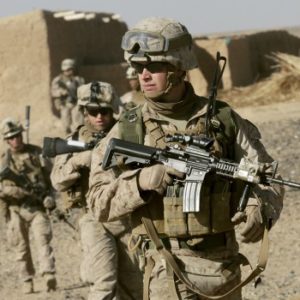After nearly two decades of continuous military engagement in Afghanistan, the withdrawal of U.S. troops marked a historic inflection point in America’s “forever war.” Our government’s failure to properly assess the cultural and historical nuances of Afghan society and support legitimate local governance enabled the Taliban’s rapid seizure of power.
We’ve watched as President Ashraf Ghani fled his country to avoid bloodshed as the Taliban laid claim to Kabul. We’ve watched as Afghans desperately clung to U.S. jets in a fatal attempt to escape. The rapidly deteriorating state of Afghanistan should be a wake-up call. We must apply the lessons learned in Afghanistan to our broader military engagement overseas to avoid repeating these mistakes.
While the United States’ traditional military strength remains unrivaled, adversarial nations and terrorist organizations have proven capable of outmaneuvering our ability to develop an effective interagency plan on the ground. Our democratic government’s need to make foreign policy decisions based on domestic American sentiment is exploited by great powers who use Gray Zone tactics, such as economic pressures, information operations, cyber threats, and proxy forces. These are low-cost, potent ways for our adversaries to maintain power without triggering a full-scale U.S. military response. If we want to end continuous deployment cycles, we must realign our national strategy to be more effective in the irregular warfare battlefield.
The Biden administration is currently reviewing its Syria policy. Northeast Syria presents a unique opportunity for the U.S. to finally engage in meaningful Gray Zone operations. The Autonomous Administration of North and East Syria (AANES) is one of the only entities in the region that embodies American values. The military of the AANES, the Syrian Democratic Forces, has been the most effective partner in the fight against ISIS and has lost more than 11,000 lives.
Our Syrian policy should be focused on supporting a self-sufficient AANES while minimizing American troop involvement. The fastest and least costly way to support our ally would be to provide designated industries with Office of Foreign Assets Control (OFAC) licenses to U.S. sanctions and streamline the process. Congress passing legislation that would provide new investment opportunities to American businesses, directing the U.S. Development Finance Corporation and U.S. Trade and Development Agency, would simultaneously support the economy of a burgeoning democracy. This private-sector, interagency approach would have a lasting impact on our national security.
It is critical that we maintain maximum pressure on the Assad regime while taking concrete steps to support the democratic forces on the ground. To that end, this effort would need to be paired with a robust monitoring and enforcement plan to ensure resources were not being redirected to the Assad regime. Properly executed, this plan would not dilute the intent of U.N. Resolution 2254, the only internationally backed plan for easing the Syrian conflict.
As the Biden administration considers its approach to U.S. engagement in Syria, it has a chance to step away from the strategies employed in the region over the last two decades. The people of northeast Syria have shown they want freedom through their actions on the battlefield, democracy through the institutions they’ve created, that they are not afraid of hard work with the reconstruction efforts already underway, and that they are a pluralistic society by empowering women to occupy high positions in government.
What the AANES needs now is our help in priming their economic engine by utilizing a private-public partnership. We cannot let an overly restrictive set of sanctions suffocate their efforts. They have achieved what we, as a nation, spent 20 years trying to put in place in Afghanistan and failed. Their success shows that a determined people, who build their institutions from the ground up, are an effective alternative to failed, American-imposed “nation-building.” Our support ensures they become a model for American foreign policy to defeat our enemies throughout the Middle East.

